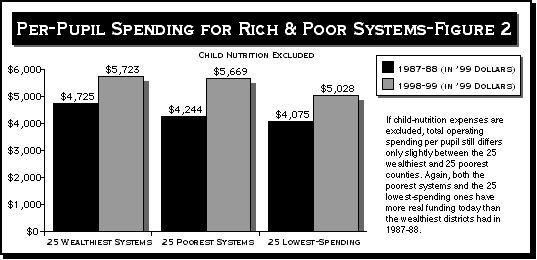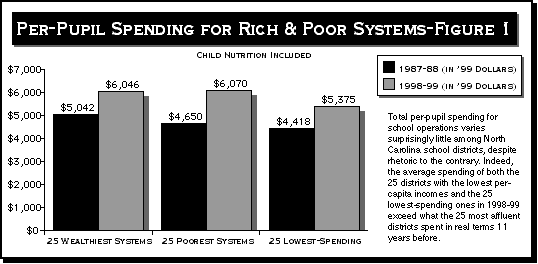One of the most controversial issues facing North Carolina state and local policymakers is equity in school funding. For more than a decade now, state courts have been adjudicating lawsuits by residents of poor, mostly rural school districts who argue that the state’s funding system is inequitable. In 1991, the General Assembly created two new streams of state funds for “low-wealth” systems and for small systems facing economies of scale. These programs cost taxpayers $113.1 million in FY 2000-01.1 The low-wealth districts are currently requesting another $43 million, even as the state faces large budget deficits.2
Unfortunately, the debate about equity in school funding has generated more heat than light. Advocates for “equalization” funds have selectively used data and ignored relevant qualifications. For example, they focus on differences in local funding which comes primarily from property taxes even though most school spending in North Carolina comes from state taxes.3 This paints a misleading picture of funding disparities. Moreover, comparisons of local tax burdens rarely include both city and county property taxes, and thus misstate the relative local tax burdens between urban and rural areas. And such comparisons rarely include variance in housing prices and other costs of living that make urban systems with greater incomes and tax bases appear more competitive in teacher compensation than is actually the case.
As research continues on these and other related issues, the graphs on the following pages can serve as indicators of just how slight the funding disparities actually are. Looking at operating spending per pupil from all funding sources in FY 1998-99, one can see that expenditures in North Carolina’s 25 wealthiest counties aren’t significantly different from those in the 25 poorest counties. Similar comparisons of the highest- and lowest-spending districts and the highest and lowest districts in local (primarily property-tax) funding also yield only small gaps.4 Federal funds as well as North Carolina’s longtime reliance on state funding already serve to “equalize” educational resources to a large degree.
Indeed, since the first of the modern school-equity lawsuits Britt v. North Carolina State Board of Education was filed in 1987, increases in statewide school funding have pushed the per-pupil spending in the state’s poorest school districts above the amount that the wealthiest school districts spent in 1987, even after adjusting for inflation (see below). Because the N.C. Supreme Court has already ruled in Leandro v. State of North Carolina that adequacy rather than equality is the proper constitutional test of a system of school funding,5 it appears obvious that, unless statewide education funding was unconstitutionally inadequate in 1987, current litigation should not lead to significant changes in the funding formula.
John Hood, President


Notes
- FY 2000-01 amounts for low-wealth and small-county funding supplied by Fiscal Research Division, N.C. General Assembly.
- Scott Mooneyham, “Money sought for poor schools,” The News & Observer (Raleigh), February 15, 2001, p. A3.
- See, for example, “North Carolina Local School Finance Study,” Public School Forum of N.C., 1993.
- Data obtained from Statistical Profile, North Carolina Public Schools, 1989 and 2000, various pages.
- John Charles Boger, “Leandro vs. State: A new Era in Educational Reform?” Popular Government, Spring 1998, p. 7.




